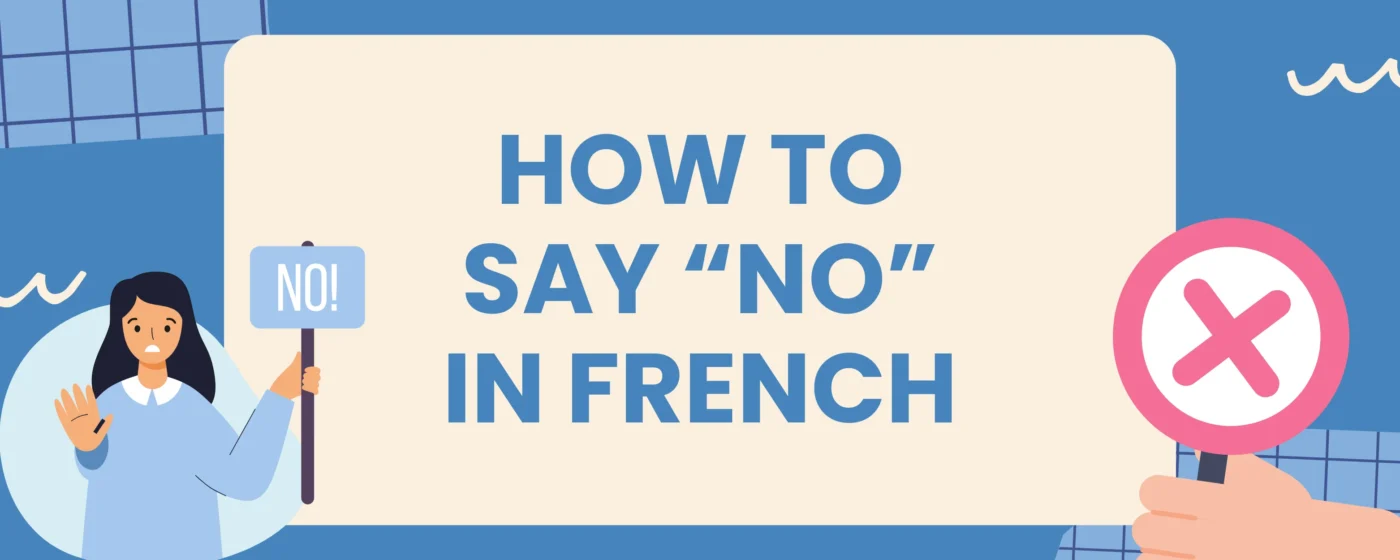Saying “no” in French goes beyond the simple “non.” It’s a nuanced skill that depends on tone, context, and familiarity with the language. Whether you’re aiming for a polite refusal or a firm denial, mastering different expressions of “no” helps you sound more fluent and culturally aware. With knowledge and regular practice, you can choose the right phrase for any situation—formal or casual, soft or assertive. In this guide, we’ve gathered 16 different ways to say “no” in French, helping you communicate like a linguistic pro.
Key Takeaways
- Know the different ways to say “No” in the French language, and also know the formal and informal ways of the “No” word.
- Learn when you try to say “No” in polite softens, such as Je suis désolé, mais non, Non merci, C’est gentil, mais non for refusals without offence.
- know the word “No” in a Firm or emphatic way, such as Absolument pas (absolutely not), Pas de question (out of the question), Je ne peux pas accepter.
- There is the word “No” and learn its casual or chill form, such as Pas du tout (not at all), Bof, non (meh), Je ne pense pas (I don’t think so), slang Nan or Nop.
- Learn the Playful or rude ways to say “No” in French, like Trop tard (too late), Je vous en prie, non (please no), and avoid Ferme ta gueule unless fighting!
Formal Ways to Say No
Non – No
Pronunciation: nohn
“Non” is the English equivalent of “no” and is pronounced as “nohn” in French. It’s extensively used in formal settings to sound polite and direct.
For example:
Example: Tu n’as pas faim? (Aren’t you hungry?) – Non, je n’ai pas faim. (No, I’m not hungry.)
In formal French communication, the meaning of “non” is a clear and direct negative response.
Je suis désolé, mais non – I am sorry, but no
Pronunciation: zh swee deh-zoh-lay meh nohn
This phrase is pronounced with a gentle, formal tone, emphasizing the polite nature of the refusal. The meaning of “Je suis désolé, mais non” is “I’m sorry, but no,” and it is commonly used in formal refusals to soften the negative response.
“Je suis désolé, mais non” is a softer way of saying “No”. It’s useful in various situations such as a refusal of an invitation to an event or a request.
Example: Veux-tu venir à ma fête ce soir? (Do you want to come to my party tonight?) – Je suis désolé, mais non, je suis déjà pris. (I’m sorry, but no, I’m already busy.)
Je ne peux pas accepter – I cannot accept
Pronunciation: zh nuh puh pah ack-sep-tay
The phrase “Je ne peux pas accepter” is pronounced as shown above and is used to formally refuse an offer or request. Its meaning in formal contexts is to express a polite but firm refusal, making it clear that acceptance is not possible.
Example: Votre proposition est intéressante, mais je ne peux pas accepter les conditions. (Your proposal is interesting, but I cannot accept the conditions.)
Cela ne m’est pas possible – It’s not possible
Pronunciation: seuh luh nay mest pah poh-seebluh
The phrase “Cela ne m’est pas possible” is used in formal refusals and means “It’s not possible for me.” It emphasizes the meaning that the action is beyond your ability, rather than simply saying no. The phrase is pronounced with a soft ‘eu’ sound in “cela” and a clear separation of each word, reflecting its formal tone.
Example: Je comprends votre demande, mais cela ne m’est pas possible de modifier ces conditions. (I understand your request, but it is not possible for me to modify these conditions.)
Want to greet someone in French? Learn ways to say hello in French for every situation in this helpful guide.
Informal Ways to Say No
Pas du tout – Not at all
Pronunciation: pah dew to
“Pas du tout”, translating to “Not at all”, is a commonly used French phrase to express negation. Not only does it express a refusal, it expresses a strong disagreement and can be used in varying contexts, ranging from casual to professional settings. ‘Pas du tout’ is also a synonym for ‘no’ in French, and learning such synonyms helps expand your understanding of how to convey negation or refusal in different situations.
For example:
Example: Tu es fatigué? (Are you tired?) – Pas du tout! (Not at all!)
Non merci – No thank you
Pronunciation: nohn mehr-see
“Non merci” literally translates to “No thank you”. It’s considered the quintessential polite way of refusing invitations or requests without sounding disrespectful. While conveying a polite “No”, it also acknowledges the offer. In fact, “non merci” is one of the most common expressions for politely refusing something in French.
For example:
Example: Voulez-vous voir d’autres modèles? (Would you like to see other models?) – Non merci, je regarde seulement. (No thank you, I’m just looking.)
Improve your French by understanding how to say yes in French correctly across different everyday situations.
Strong/Emphatic Ways to Say No
Absolument pas – Absolutely not
Pronunciation: ahb-soh-lyoo-mahn pah
“Absolument pas” literally translates to “Absolutely not” or “Definitely not”. This phrase is used to emphasize total disagreement in a situation. It’s basically a firm “no” with extra force! In French, “absolument pas” is often used to mean “not a chance,” making it a strong way to reject an idea or possibility.
For example:
Example: Est-ce que tu crois que je vais laisser faire ça? Absolument pas! (Do you think I’m going to let that happen? Absolutely not!)
Pas de question – Out of the question
Pronunciation: pah deuh kes-tyohn
“Pas de question” is used to completely dismiss an idea or proposal, indicating that it is unacceptable. It is an extremely firm way to suggest that the idea is utterly impossible. This phrase is often used to express the contrary opinion or to strongly oppose an idea.
For example:
Example: Tu veux que je mente pour toi? Pas de question. (You want me to lie for you? No way.)
Casual Ways to Say No
Bof, non – Meh, no
Pronunciation: boff nohn
“Bof, non” translates to “Eh, no” in English. It’s a casual way of conveying a reluctant or indifferent refusal. It expresses a lack of enthusiasm and interest, in casual settings. This variation of “no” can often be heard in everyday conversations and is sometimes found in comic books as a written form of relaxed speech.
Example: Tu aimes cette chanson? (Do you like this song?) – Bof, non. (Eh, no.) If you want to avoid misunderstandings caused by French false friends (faux amis), check out this helpful guide.
Je ne pense pas – I don’t think so
Pronunciation: zhuh nuh pawnz pah
“Je ne pense pas” is the French equivalent of “I don’t believe so”. It’s a common and versatile way of expressing doubt, conveying disagreement or a soft refusal in casual settings. It’s considered as a casual way of saying “no” to soften the blow of a negative response. This phrase is one of the variations of saying “no” in casual French.
Example: Est-ce qu’il va pleuvoir? (Is it going to rain?) – Je ne pense pas. (I don’t think so.)
Lost for Words? We’ve Got You!
Sign up for our courses and let our expert teachers boost your vocabulary effortlessly!
Playful Ways to Say No
Trop Tard – Too late
Pronunciation: troh tahr
“Trop tard” literally translates to “Too late” in English. While one can use it literally, it’s more than often utilised humorously or playfully to refuse something, especially in casual settings. It can add a lighthearted touch to a refusal, making it less harsh among friends or family.
Example: Tu veux m’aider à faire la vaisselle? (Do you want to help me do the dishes?) – Trop tard, j’ai fini! (Too late, I’m finished!)
Je préfère pas – I’d prefer not
Pronunciation: zhuh preh-fair pah
“Je préfère pas” literally means “I’d rather not”. This is a soft manner to politely decline without being too harsh, rather than a firm “no”. It’s often used in casual settings, amongst friends or with family members. This playful expression is one of many French idioms and expressions used to convey negation in a friendly way.
Example: Tu veux aller faire du shopping? (Do you want to go shopping?) – Je préfère pas. (I’d rather not.)
Polite Ways to Say No
Je vous en prie, non – Please, no
Pronunciation: zhuh voo ahn pree nohn
“Je vous en prie, non” literally translates to “I beg you, no”. This expression is a polite, respectful, but determined way of conveying refusal in a situation. It’s a way of declining a persistent offer while remaining polite in formal situations. For example, you can use “je vous en prie, non” to politely refuse offers such as wine.
Example: Je dois vous demander de faire ceci. (I must ask you to do this.) – Je vous en prie, non. (I beg you, no.)
C’est gentil, mais non – That’s kind, but no
Pronunciation: seh zhahn-tee meh nohn
“C’est gentil, mais non” translates to “It’s very nice of you, but no” in English. It’s a common and versatile way to express refusal while remaining polite and acknowledging the offer. This is a polite expression often used for refusing offers. Learning such French expressions in context helps you better understand their meanings and nuances. It can be used in a range of situations, from casual to formal settings, anywhere you don’t want to hurt someone’s feelings while saying “no”.
Example: Je peux vous aider avec vos courses? (Can I help you with your groceries?) – C’est gentil, mais non, je peux me débrouiller. (That’s kind, but no, I can manage.)
Enhance your French farewells with this guide on ways to say “Goodbye” in French.
Regional and Slang Ways to Say No
Nan – Nah
Pronunciation: nahn
“Nan” is a casual informal way of saying “No”. It literally translates to “Nah” in English. It’s more regionally common in the south of France, primarily used in spoken language. You’ll often hear people speak this way in everyday conversations, and “nan” is also commonly found in comic books as a written form of casual speech. It’s suitable only to be used in casual settings, among family members or with close friends.
Example: Tu viens avec nous? (Are you coming with us?) – Nan. (Nah.)
Nop – Nope
Pronunciation: nop
“Nop” is an informal slang word for “no” in French. It translates to “Nope” in English and is majorly used by the young population in spoken or online communication. As a word, ‘nop’ is similar to ‘nan’, which is another casual or informal way to say ‘no’ in French, often seen in texting, comics, and spoken dialogue. It carries a lighthearted tone, conveying a refusal without sounding harsh in casual settings.
Example: Tu as fini ton travail? (Did you finish your work?) – Nop. (Nope.)
If you want to master the French language and improve your skills further, enrolling at La Forêt French Class can enhance your learning experience.
Frequently Asked Questions
1. Are there any other ways to say “no” in French?
Ans: Of course, “Nenni” (an archaic form of “non”) is found in older literature or very formal contexts, but is almost never used in modern spoken French! Here are some more examples of alternative ways to say ‘no’ in French: “Pas du tout” (not at all), “Absolument pas” (absolutely not), and “Certainement pas” (certainly not).
2. Why do French people sometimes repeat “non” multiple times?
Ans: Repeating “non” (non, non, non) intensifies the refusal, expressing strong disagreement or denial. It’s a way to make it very clear that the answer is “no”!





